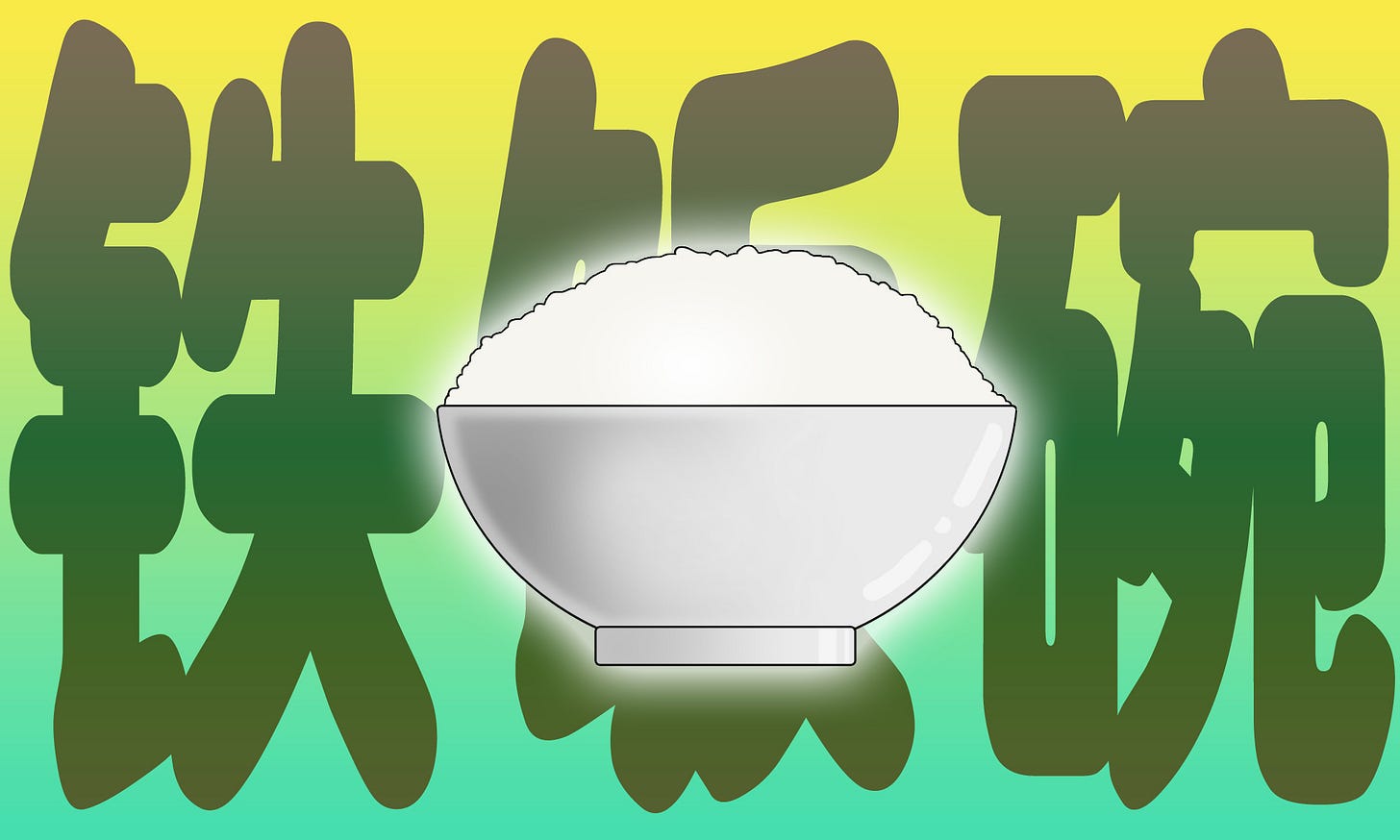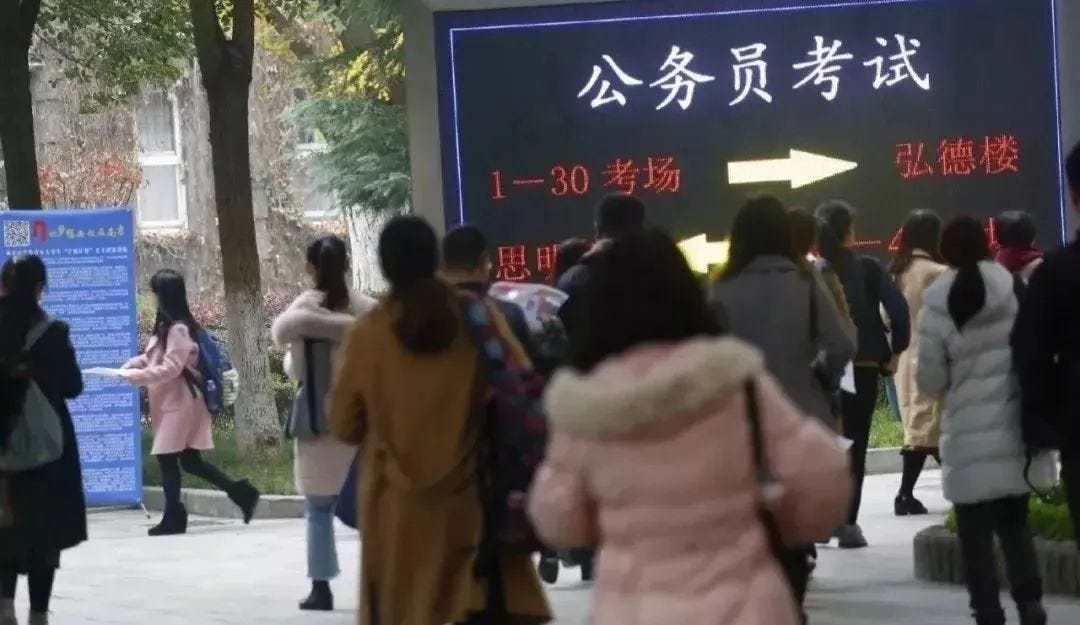Welcome to RealTime Mandarin—a multimedia resource to immerse you in the latest Chinese language trends, inspire you to practice and improve your Mandarin every week, and empower you to communicate with confidence.
Subscribe now to get the next issue straight to your inbox!
The number of people taking postgraduate studies in China in 2024 has fallen.
After eight years of consecutive growth, 360,000 fewer students registered for China’s postgraduate entrance exams, or kǎoyán 考研, next year.
Previously seen as necessary to land a good job in China’s private sector, degree qualifications are losing their appeal.
Whereas interest in getting a job in the public sector, or 考公 kǎogōng, has gone up:
As the "postgraduate entrance examination fervour" is cooling down, the "public examination fervour" is heating up. In 2023, the number of people accepted into the national civil servant examination exceeded 2.5 million, an increase of 500,000 year-on-year, and the highest increase in the past decade. For the 2024 national civil servant exam, over 3 million people are eligible, reaching a record high. The competition has also become fierce, with an average of 77 people competing for one civil servant position.
“考研热”降温的同时,“考公热”却在升温:2023年国考资格过审人数超250万,同比增加了50万人,增幅达近十年之最;2024年国考也已有303.3万人顺利通过用人单位的资格审查,有史以来首次突破300万人大关,而竞争之激烈也已白热化,平均每个公务员职位有77人争抢。[1]
"Public Examination Fervour" (考公热 kǎo gōng rè) is the phrase describing this increased interest in taking the public service examination, which is the first step to becoming a civil servant in China.
A career in China’s fast-paced private companies, especially the tech giants, is less attractive than it was in China’s boom years. “Involution” (内卷), which we translate as “intensely competitive”, and the toxic 996 working culture has put people off.
Mass layoffs are also a factor, and how people over 35 can be deemed too old and unable to keep up.
Whereas a job in the civil service is seen as protected against such layoffs and is less ageist.
It’s human nature to seek advantages and avoid risks. Since one must have a job, it is of course more secure to be able to hold an "iron rice bowl" job. Nowadays, for many people, it is better to find a job, especially a job within the system, now than to find a job three years later (when they finish their Master’s degree). Therefore, in the past two years, the number of people taking the public examination, educator examination, and public institution staffing examination has increased sharply.
趋利避害、厌恶风险是人的本能,同样是找个饭碗,那能捧着铁饭碗当然更安心。如今对很多人来说,三年之后再就业,不如现在就赶快找个工作,尤其是体制内的工作,于是,近两年来考公、考招教、考事业编的人数都在激增。[1]
A public sector role is also known colloquially as the “iron rice bowl” which we discuss more below.
The “iron rice bowl” is becoming attractive to young people in China who are faced with job uncertainty at the start of their careers.
Of course, taking the public examination has become an attractive option, especially since you can only apply to one school for the Master's. However, for the public examination, you can choose from national examinations, provincial examinations, municipal examinations, and public institution examinations, so relatively speaking, you have more opportunities. The public examination has fewer requirements for academic qualifications. Students from 985, 211 and mainstream universities are all on the same starting line, which is very favourable to people with relatively poor undergraduate backgrounds.
考公当然就成了具有吸引力的选择,特别是考研只能报考一家,考公可以有国考选调省考市考事业编,机会相对来说会更多。考公对学历限制较少,985、211和双非院校都在同一起跑线,这对本科背景相对较差的人非常友善。 [1]
But with the increased popularity of a job in the civil service, there’s greater competition, and tougher entrance exams:
Among the people who have passed the public examinations, there are many who have tried two and even three times. The academic requirements for public examinations are becoming more demanding, while candidates are becoming increasingly short-sighted due to the pressure to get a job. The pass rate is getting lower with the options available shrinking. The public examination system has fallen into a vicious cycle, which is the worst case scenario.
在考公的人中上岸的这些人里,还不泛“二战”甚至“三战”的往届生。公考的学历要求在提升,考生在就业压力下的选择越来越短视。考生碰壁的几率在增大,公考可选择的余地在变小,公考最坏的局面就是陷入这种恶性循环。 [2]
So, that’s what we’re exploring this week!
Favourite Five
1. 托底 tuō dǐ
safety net, fallback
那会至少还有高薪岗位吸纳就业,再不济,还有教培托底 - At that time, there would be high-paying positions to provide employment at the very least. If things went down, there was still the safety net of educational training. [1]
Related:
兜底 dōudǐ - bear the cost of something that one cannot afford
保底 bǎodǐ - guarantee
保障 bǎozhàng - assurance
2. 考公热 kǎo gōng rè
civil service examination fervour
值得注意的一点是,“考研热”降温的同时,“考公热”却在升温 - It's worth noting that while the enthusiasm for postgraduate exams is cooling down, there is a rising fervour for civil service examinations. [1]
Related:
国考 guó kǎo – national civil service examination
省考 shěng kǎo – provincial civil service examination
编制 biān zhì – officially budgeted post in the public sector
考研热 kǎo yán rè – postgraduate exam fervour
备考者 bèi kǎo zhě – exam candidates (preparing for the exams)
体制外 tǐ zhì wài – outside the system (refers to individuals or entities outside the public sector)
3. 铁饭碗 tiě fàn wǎn
secure and stable public sector job
同样是找个饭碗,那能捧着铁饭碗当然更安心 - When looking for a job, it's certainly more reassuring to secure a stable public sector job. [1]
Related:
谋个饭碗 móu ge fàn wǎn – seek a job
混碗饭吃 hùn wǎn fàn chī – get by with a job
4. 照本宣科 zhào běn xuān kē
teaching by rote
许多大学课堂上只是照本宣科,学生的求知欲、探索欲也普遍低落 - In many university classrooms, the approach is teaching by rote with students' curiosity and desire to explore generally low. [1]
5. 有枣没枣打一杆子再说 yǒu zǎo méi zǎo dǎ yì gān zi zài shuō
give it a try, whether there's a reward or not; it doesn’t hurt to try
虽然考公成功的概率很小,但“有枣没枣打一杆子再说”,说不定考上了呢 - Although the probability of success in the civil service exam is low, it doesn’t hurt to try. Who knows, you might succeed. [1]
Consuming the Conversation
Useful words
6. 费解 fèi jiě
bewildering
乍看起来,这确实是一个令人费解的转折 - At first glance, this is indeed a bewildering turn of events. [1]
7. 啃老 kěn lǎo
relying on parents financially
在家啃老,花费也总比去读研低得多 - Being financially dependent on parents at home is much less expensive than pursuing postgraduate studies. [1]
8. 冲浪 chōng làng
ride the waves, surf
让他们能安心在时代大浪中冲浪,得到更好的回报 - Allow them to ride the waves of the era with peace of mind and reap better rewards. [1]
9. 拉平 lā píng
narrowing (the gap)
研究生与本科生的就业鸿沟正在已肉眼可见的速度拉平 - The employment gap between postgraduates and undergraduates is visibly narrowing. [2]
10. 盲从 máng cóng
blindly follow
集体的盲从,结果往往是灾难性的 - Collective blind obedience often results in catastrophic consequences. [2]
11. 碰壁 pèng bì
encounter obstacles, hit a wall
考生碰壁的几率在增大,公考可选择的余地在变小 - The likelihood of candidates failing is increasing, and the room for options in civil service exams is shrinking. [2]
Three-character phrases
12. 敲门砖 qiāo mén zhuān
entry ticket, stepping stone
没有学历作为敲门砖,你或许连面试机会都得不到 - Without educational qualifications as an entry ticket, you may not even get the chance for an interview. [1]
Related:
入场券 rù chǎng quàn – Entry pass (literally, entrance ticket)
13. 双一流 shuāng yī liú
double first class universities in China















